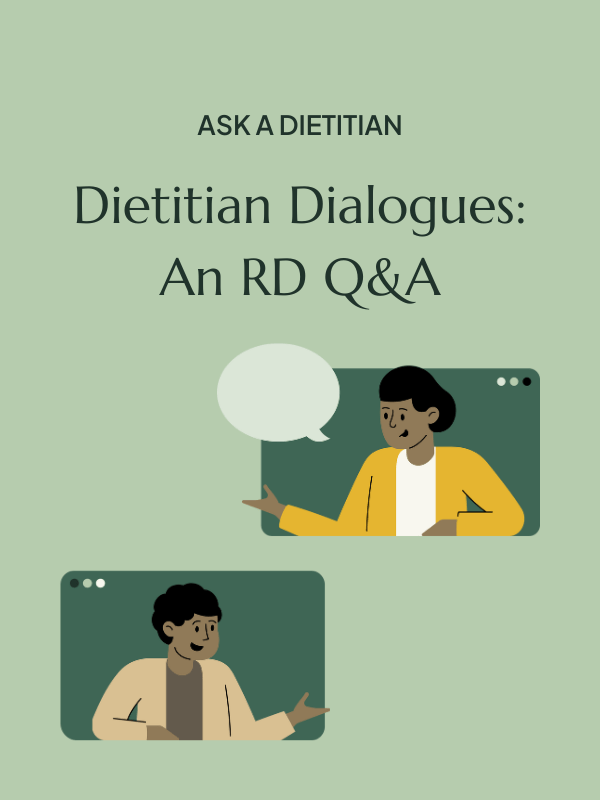Weight Loss Medication Q&A with Jessica Shapiro, R.D.

In recent years, weight loss medications have seemingly exploded in popularity and into the mainstream consciousness. Words like Ozempic, Wegovy, and semaglutide are now in the public lexicon. But these medications are not for everyone—and there is much misinformation out there we want to dispel. To set the record straight on how weight loss medications work, and how weight loss medications can be part of someone’s sustainable, lasting weight loss journey, we tapped Jessica Shapiro, RDN, CDCES, CDN, to consult. Jessica is a Registered Dietitian (RD) at Culina Health who is a certified diabetes care and education specialist, and specializes in sustainable weight loss.
How can RDs support patients who are taking weight loss medications?
At Culina Health, we recommend that weight loss medications, or anti obesity medication (AOMs), are only prescribed as part of a holistic lifestyle change. We focus on supporting our patients with individualized counseling and arming them with the resources they need for achieving optimal nutrition intake, as well as supporting improvements in all lifestyle factors that can impact weight management and quality of life. This ranges from nutrition education to things like sleep, stress, exercise, alcohol use, and more. RDs can play a critical and active role in preparing, monitoring and managing any issues that may emerge for patients using weight loss medications. Some of the challenges an RD can help troubleshoot include nutritional deficiencies that arise from eating less, decreased appetite, GI side effects, too much weight loss, weight loss plateaus, and tolerance to physical activity.
How do you determine if a patient might be a good candidate for weight loss medication?
It is always best to speak with your primary care provider, who would be the person prescribing the medication, to determine the appropriate type of medication for you. Make sure to work with a provider who is board-certified in obesity medicine or has been specifically trained in obesity medicine, so you know you’re getting the right type of support from an expert.
Some questions a provider may consider when deciding if/what to prescribe a patient may include:
- What risk factors or adverse effects are possible for this particular patient?
- The cost of the medications or what insurance coverage is available
- What other protective benefits can be of value for this patient based on their other conditions or risk factors?
How do weight loss medications work?
There are different classes of weight loss medications that work in different ways. Here, we are speaking to the medications that were developed to mimic the naturally-secreted hormones by our intestines in response to food. This includes GLP-1 (Glucagon-like peptide-1) and GIP (Gastric inhibitory polypeptide or glucose-dependent insulinotropic polypeptides). These hormones and medications are often used in treating type 2 diabetes.
You can think of these hormones as being similar to the conductor of an orchestra. They have a variety of roles including regulating metabolism, impacting blood sugar control, and overall metabolic regulation. These hormones also:
- Stimulate insulin to be released from the pancreas so there is less glucose floating around the body. They also improve insulin sensitivity, or how responsive your cells are to insulin.
- Act as a sort of “traffic cop” for the stomach. They slow gastric emptying which results in feeling full and satisfied sooner after eating and reducing appetite.
- GIP, in particular, is known as the “glucose whisperer.” It plays a crucial role in ensuring glucose gets into the cells efficiently.
What are weight loss medications used for?
Common weight loss medications medical providers prescribe include a GLP-1 agonist, a GLP-1 receptor agonist, or dual GLP-GIP-receptor agonists. “Agonist” means that it mimics the natural version of those hormones.
These weight loss medications were originally marketed for blood sugar control in adults with type 2 diabetes, recommended in tandem with diet and exercise. In addition to blood sugar control, providers found weight loss to be a significant secondary benefit to many of these patients.
These medications are now being prescribed to patients who do not have type 2 diabetes, and in some cases, can be bought over the counter or without insurance. We really advise patients to consult with their health care providers before embarking on weight loss medications.
Are there any safety concerns or risks to be aware of when using weight loss medications?
Generally, medical providers consider weight loss medications to be safe. However, there are certain people who shouldn’t take them. This includes people who are pregnant, breastfeeding, have significant GI conditions, have a history of thyroid cancer, or have a history of pancreatitis.
Common side effects or adverse events of taking weight loss medications include loss of appetite, nausea, vomiting, diarrhea, and constipation.
However, these side effects tend to not be long-lasting, and are more likely to occur when a patient is first starting to use the medications or when increasing dose.
What happens if you use weight loss medications long term?
There is not enough data around the long-term efficacy or outcomes of sustained weight loss medication use at this point. We have also seen medication shortages happen before, and they still occur today. It is risky to rely on a medication that might, at any time, become available.
What needs to be done in tandem with medication to achieve sustainable weight loss?
As noted previously, we only recommend weight loss medication as a component of a holistic weight management journey. A holistic weight management journey includes nutrition care, lifestyle interventions, and physical activity. Some examples of recommended lifestyle changes include:
- Aiming for an overall healthy dietary pattern with high nutrient diversity.
- Opting for whole foods over highly processed foods. (Cooking more at home is a great way to achieve this!)
- Consuming adequate amounts of protein throughout the day. You can also add protein supplements to meet protein requirements as needed.
- Working towards getting 150-300 minutes of exercise a week (only 20-30 minutes a day!). Make sure to include resistance or weight bearing activities. That will ensure you’re building strength and not losing muscle as your weight decreases.
- Asking for support if you need it! Talk to a friend, a loved one, find an online support group, or work with a registered dietitian to have a partner in the journey.
Additionally, patients can achieve sustainable weight loss as long as they reach their maintenance dose and stay on the medication. It’s incredibly common for people who come off of anti obesity medication to experience weight regain or weight gain. But even if a patient stops taking the medication, they will be armed with the beneficial lifestyle modifications they fine-tuned with an RD during their weight loss journey, and likely have more healthy habits on their side. So even though weight regain can be common once no longer using a weight loss drug, an RD will work to arm patients with nutritional and lifestyle habits they can sustain forever.
How does weight loss medication impact patients?
In addition to weight loss, there are some significant benefits that many weight loss medication patients see. Here are some of the most common changes and benefits they report.
Reduced “Food Noise”
Some of the biggest benefits we see from patients using anti obesity drugs is the decrease in obsessive thoughts about food. We sometimes call this ‘food noise’—that little voice inside your head that tells you that you’re hungry when you are not. Or tells you to keep eating when you are already full, or telling you that you NEED something sweet or salty. We all have that part of our brain that talks about food and hunger, but some people’s food noise or chatter is much louder and more demanding than others. When this background noise quiets, it can often lead to a remarkable transformation. It can help someone feel freer from obsessive thoughts about food, and open up that brain space for other positive habits.
Emotional Benefits
Using a weight loss drug can also allow people who have faced lifelong difficulty losing weight to finally experience a breakthrough. People who have lived with obesity often face weight stigma, or poor treatment because of their weight or body size. In response, this can take a major toll on one’s emotional and physical health. Many patients we see feel like they’ve tried everything, and feel hopeless after not seeing results. Finally seeing success with weight loss medication allows for them to better understand why they have had such difficulty losing weight in the past and understand that obesity really is genetic, and thus that it’s not their fault.
Non-Scale Victories
There are also immense victories that have to do with physical health, but nothing to do with the number on the scale. People using weight loss medication often see better blood sugar control, improved labs and lipid levels, and improved blood pressure. They’ll also often experience improvements in sleep, energy levels, and mobility. These factors all can lead to improved quality of life and physical comfort.
Weight loss medication myths and misconceptions
There are so many myths and misconceptions surrounding the use of anti-obesity medications. Here are a few of the most common ones we hear from patients, and how we respond.
- MYTH: It’s just about weight loss.
- FACT: This journey may have started with weight loss, but that’s not all. It’s also about health gains. Make sure to keep an eye on, and celebrate, those non-scale victories. Such as improvements in sleep, energy, lab values, blood pressure, endurance, and so much more. Try keeping a diary! You can track improvements in how you feel, reflections, foods you’re enjoying, recipes, and more.
- MYTH: The weight loss will stay consistent the entire time you’re using an anti obesity medication.
- FACT: Plan for plateaus and stalls to happen. A person will not, and cannot, continuously shed weight at the same rapid rate. This doesn’t mean you’re failing and is a natural part of the process. Your RD can walk you through any stalls and make sure we’re continuously optimizing for both scale and non-scale victories.
- MYTH: Anti-obesity medications will work for everyone.
- FACT: Some people are non-responders, who will not react to or experience changes from using weight loss medications. We still need more research done in order to determine what makes a person a non-responder. If a patient ends up being a non-responder, an RD can help manage this experience and find other ways to support your weight loss goals.
- MYTH: More weight loss, as fast as possible, is the goal.
- FACT: Not all weight loss is created equal. Providers want to help you ensure you are losing the right kind of weight. You want to lose adipose tissue, not muscle tissue. The medical community discourages losing high amounts of weight over a short time period, as it can be extremely risky. While losing weight, make sure you preserve lean body mass by consuming enough protein and doing resistance training or weight bearing exercises.
Get support from a registered dietitian on your weight loss journey
Get in touch with the team at Culina Health to schedule an appointment with one of our amazing dietitians to support you on your weight loss journey. Most of our patient’s nutrition counseling sessions are covered by insurance, and we offer affordable memberships. You are not alone!
Any general advice posted on our blog, website, or application is intended for reference and educational purposes only and is not intended to replace or substitute for any professional medical advice, diagnosis, treatment, or other professional advice. If you have specific concerns or a situation arises in which you require medical advice, you should consult with an appropriately qualified and licensed medical services provider.



